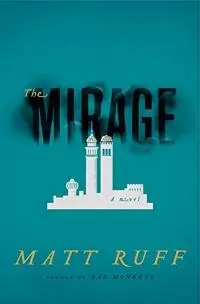Remember those 'What If' comics that Marvel used to put out? There was the one that asked what would have happened if the black costume had possessed Spider-Man, and another that posited what things would have been like if Dr. Doom was viewed as a hero. I couldn't help but be reminded of these while reading Matt Ruff's new novel 'The Mirage,' considering the story plays off that same 'what if' premise.
What if America was a third world country?
What if the Middle East had planes crashed into their twin towers?
These are the questions Ruff poses while crafting a novel that takes everything we know about 9/11 and turns it on its head. Four planes are hijacked by Christian fundamentalists and flown towards Arab targets: the Tigris and Euphrates World Trade Towers, the Arab Defense Ministry, and a fourth target believed to be Mecca. This last plane never reaches its destination, and is taken down in a way that you're probably familiar with. Another major difference is that the hijackings in this parallel reality take place on 11/9 instead of 9/11, which I imagine is Ruff's way of keeping people from getting confused. These events lead to the War on Terror, in which Arab troops set up a Green Zone in Washington D.C.
 During the search of a prisoner's house, evidence of our real world 9/11 surfaces in the form of an old copy of the New York Times. The prisoner makes the claim that this world, the one where Arabia is the superpower, is not the true reality. It is, in fact, a mirage. This theory is built upon as other captured American 'terrorists' make the same claim, and in order to discover the truth (which reality is which) an investigation is begun.
During the search of a prisoner's house, evidence of our real world 9/11 surfaces in the form of an old copy of the New York Times. The prisoner makes the claim that this world, the one where Arabia is the superpower, is not the true reality. It is, in fact, a mirage. This theory is built upon as other captured American 'terrorists' make the same claim, and in order to discover the truth (which reality is which) an investigation is begun.
Now that probably sounds like a decent premise. It's pretty much the reason I chose to read this book. However, much of Ruff's novel is spent on building the parallel universe which, all things considered, kind of loses its cool factor about halfway through. Some aspects of the alternate reality are satired to the point of being absurd, such as its version of the Bush administration. Granted, Ruff had a considerable task ahead of him in the area of suspending a reader's disbelief with the premise alone. Certain readers may feel that the balance of believability is compromised by some of the 'cameos,' as I've come to refer to them. The Library of Alexandria, for instance, is a Wikipedia of sorts that fills in background information and certain aspects of history (the parallel history, that is). I thought that was brilliant on Ruff's part. Other appearances and cameos didn't work so well. Either that, or they felt unnecessary, such as 24/7 Jihad which is a reference to the TV show 24.
See enough of these and you might get a case of the sighs and eyerolls. Ruff spares nothing when it comes to building his universe, and that might be part of the problem.
Now this wouldn't be such a hassle if we were both plot and setting-heavy, but unfortunately, the plot is a little flat. Oh sure, the wonderful premise will have you foaming at the mouth: 'What If' comic and Fringe fans will know what I'm talking about. The difference between something like Fringe and The Mirage is that the latter uses the conceit as more of a slick gimmick. Simple amusement. Fringe, on the other hand, has achieved that perfect balance with the usage of two universes: with setting, character, and especially plot.
Simply put, The Mirage has a promising premise, but I've seen this sort of thing done before (and done better) in other places. The contrast effect is overdone, the ending a bit on the weak side, and the book could have easily been chopped down 100 pages. This was one of those books where perhaps my expectations were too high after reading that grabbing synopsis and the Publisher's Weekly starred review. I would try out another book by Matt Ruff, as I believe he is an author of great capability and ideas, however, this one in particular just didn't work for me.
Get The Mirage at Bookshop or Amazon









